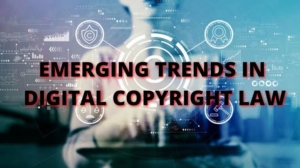Emerging Trends in Digital Copyright Law
The Internet has become an indispensable part of our lives, revolutionizing how information is accessed and shared. Search engines enable the rapid reproduction of original works, making digital copyright enforcement a growing challenge for intellectual property (IP) professionals. As a result, a robust and comprehensive digital copyright framework is essential to address these concerns.
Current Trends and Issues in Digital Copyright Law
Digital technology has significantly impacted the creation, dissemination, and protection of copyrighted works. While digitization has made it easier to manipulate, reproduce, and distribute creative content, it has also led to increased unauthorized use and piracy. The ability to make perfect copies at minimal cost threatens traditional distribution models and the rights of copyright holders.
With the decentralized nature of the Internet, users can disseminate copyrighted works globally through countless platforms, contributing to widespread piracy. Estimates suggest that losses from pirated books, music, and entertainment software amount to billions of dollars annually. The Internet has, in many ways, transformed users into mass distributors of copyrighted content, disrupting the balance between authors and consumers.
Key Issues in Digital Copyright Law
-
The Right of Reproduction
The Internet has blurred the boundaries of reproduction rights. The transmission of protected works online involves temporary reproductions stored in the RAM of connected devices. This raises the question of whether copyright holders should have control over these transient copies. The WIPO Performances and Phonograms Treaty grants producers the exclusive right to authorize direct or indirect reproduction of their protected works in any form (Articles 7, 11, and 16). -
The Right of Communication to the Public
Digital technology makes it easier than ever to communicate copyrighted works to the public, often without the author’s consent. The issue of secondary liability—where entities such as Internet Service Providers (ISPs) facilitate copyright infringement—remains unresolved in many jurisdictions. Authors face significant challenges in protecting their rights in an environment where content can be shared limitlessly.
The Google Case: Authors Guild, Inc. v. Google Inc.
One of the most notable copyright cases in the digital age, Authors Guild, Inc. v. Google Inc., addressed the legality of Google’s mass digitization project.
Google partnered with major research libraries to scan more than 20 million books for its Google Books project. The Authors Guild and individual copyright holders filed a lawsuit, alleging that Google had scanned copyrighted works without permission or licensing fees. Google, however, argued that its use constituted fair use, as it provided only limited previews of books and facilitated research.
The United States District Court for the Southern District of New York ruled in Google’s favor, holding that digitization and limited display of copyrighted works constituted fair use. This ruling set a significant precedent for how digital content is treated under copyright law.
The Indian Scenario
The Google case had a profound impact on Indian copyright law, influencing legislative changes to address digital copyright challenges. The Copyright Amendment Act, 2012, introduced key amendments aligning India’s copyright framework with the WIPO Performances and Phonograms Treaty (WPPT).
Key Amendments in the Indian Copyright Act
-
Fair Dealing Exception (Section 52): Expanded to include reporting of current events, including public lectures. Previously, fair dealing was limited to:
- Private or personal use, including research.
- Criticism or review of any work.
-
Storage in Electronic Medium: The amendment clarified that storing a work in electronic form for research, access, or integration does not constitute infringement, provided it does not involve an infringing copy.
-
Temporary Storage for Online Access: The law permits transient and incidental storage of copyrighted material, such as cached web content, unless the copyright holder expressly prohibits it. However, if a copyright owner raises a complaint, the infringing content must be removed unless a court order is obtained within 14 days for continued removal.
The Path Forward
The digital era has introduced both opportunities and challenges for copyright protection. While technological advancements have facilitated creativity and knowledge sharing, they have also created significant hurdles for copyright enforcement. Governments and regulatory bodies are continuously working to strengthen copyright laws to address digital infringement while maintaining a balance between fair use and intellectual property protection.
This publication is for general informational purposes and does not constitute legal advice. This content is protected by copyright. © 2022 Astrea Legal Associates LLP
Contributed by : Ms. Sonya Mohan Associate Advocate





